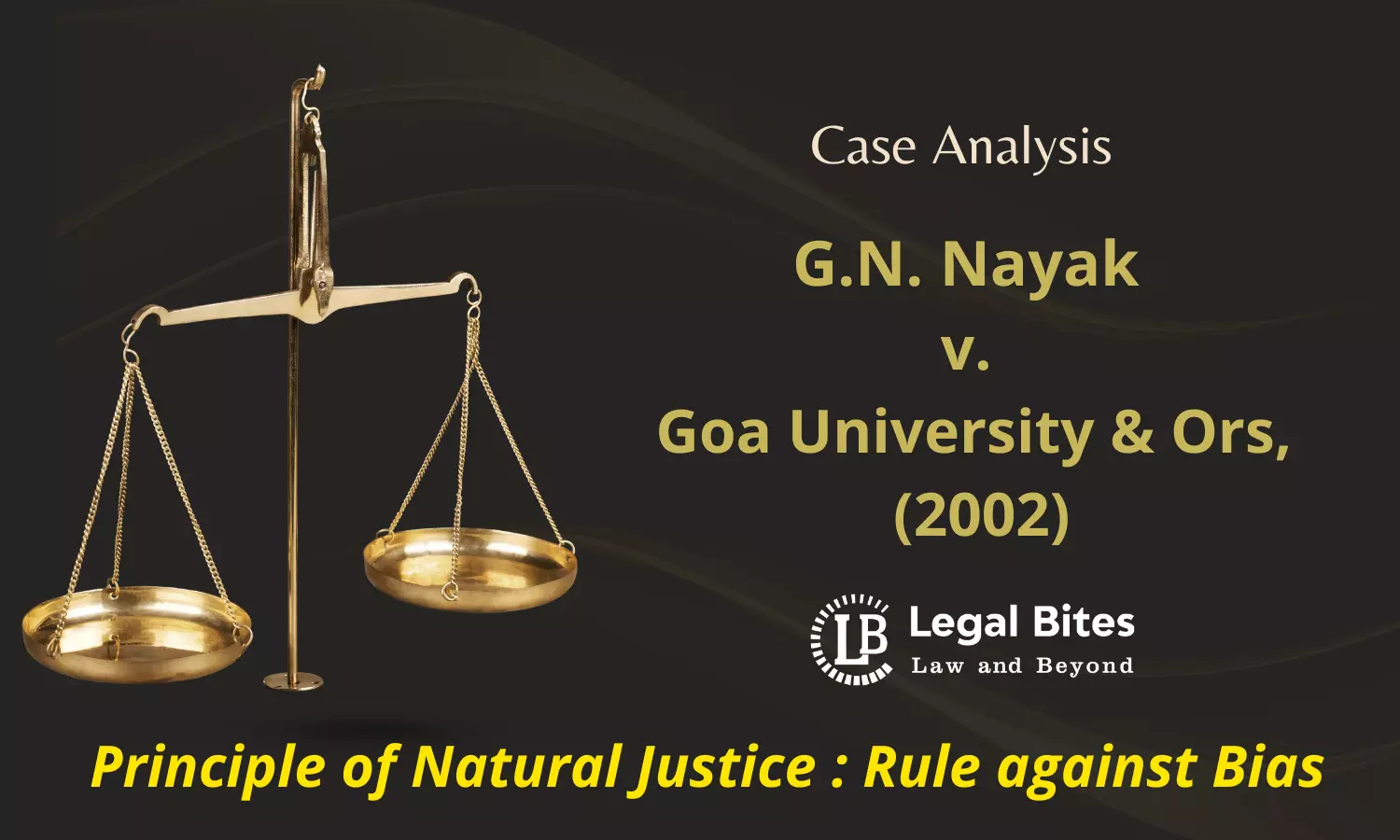Case Analysis: G.N. Nayak v. Goa University & Ors, (2002) | Rule against Bias
Here is a case involving administrative law that primarily focuses on the issue of bias in the selection process for a professor at a university.

Here is a case involving administrative law that primarily focuses on the issue of bias in the selection process for a professor at a university.Case Title: G.N. Nayak v. Goa University & Ors.Court: Supreme Court Citation: AIR 2002 SC 790; (2002) 2 SCC 712 Judges: Justice S. Rajendra Babu & Justice Ruma Pal Date of Judgment: January 29th, 2002 Facts In 1991, the post of Professor, of Marine Science at the University of Goa fell vacant. Many advertisements were put out but...
Here is a case involving administrative law that primarily focuses on the issue of bias in the selection process for a professor at a university.
Case Title: G.N. Nayak v. Goa University & Ors.
Court: Supreme Court
Citation: AIR 2002 SC 790; (2002) 2 SCC 712
Judges: Justice S. Rajendra Babu & Justice Ruma Pal
Date of Judgment: January 29th, 2002
Facts
- In 1991, the post of Professor, of Marine Science at the University of Goa fell vacant. Many advertisements were put out but a suitable candidate was not found.
- On August 10, 1994, another advertisement was distributed for the post with specific minimum qualifications prescribed. Both the appellant and respondent No. 5 applied.
- The Head of Department (hereinafter “HoD”) wrote a note to the Vice Chancellor requesting urgent interviews as the appellant had received an offer for Professorship elsewhere. The note praised the appellant’s qualities.
- Respondent No. 5 obtained this note and wrote letters alleging bias against him in the upcoming September 1995 selections. The Vice-Chancellor did not reply.
- Respondent No. 5 filed a writ petition seeking the removal of the HoD from the selection committee due to apprehended bias. This was withdrawn on September 12, 1995.
- Interviews were held on September 13, 1995, but neither candidate was found suitable.
- In October 1995, a fresh advertisement was issued with amended additional qualifications. A new selection committee was formed which included the HoD.
- On May 20, 1996, the selection committee recommended the appointment of the appellant. This was approved by the Executive Council.
- Respondent no. 5 filed another writ petition challenging this selection on grounds including illegal amendment of qualifications, the faulty constitution of the selection committee, bias, and the appellant’s lack of qualifications.
- The writ petition filed by respondent No. 5 was allowed by the High Court. This order was challenged in the apex court by the appellant.
Issues
- Whether respondent no. 5 can re-agitate the same issues since he had withdrawn the earlier writ petition without liberty to file afresh.
- Whether the amended qualifications in the 1995 advertisement were illegally prescribed without the approval of statutory bodies.
- Whether the appellant met the required qualification of 10 years of teaching/research experience.
- Whether the Selection Committee was constituted as per Statute 15 of the University.
- Whether the HoD’s praise for the appellant in his note amounted to bias against respondent no. 5.
- Whether failing to record the grading/assessment process of candidates violates any rules
Laws Applied
- The Constitution of India, 1950
- Goa University Act, 1984
- Indian Forest Service (Initial Recruitment) Regulations, 1966
Arguments Before Court
- The appellant contended in its preliminary objection that the second writ petition filed by the respondent was not maintainable as respondent no. 5 had withdrawn their first writ petition on the same cause of action without the liberty to file afresh.
- The respondent could not challenge the amendment to the eligibility qualifications since he participated in the selection process without any protest.
- The appellant further argued that the Selection Committee was validly constituted with subject experts from the panel approved by the University bodies and that mere appreciation of the appellant’s qualities does not amount to bias that would vitiate the unanimous selection decision.
- In addition, the appellant’s pre-doctoral research experience could be counted towards determining his eligibility, and the Selection Committee found him to be qualified on this basis.
- The respondent argued that the eligibility criteria for the post were illegally amended in violation of the University Statutes. The Selection Committee was not properly constituted as per Statute 15.
- Further, no records were kept of the grading and assessment process used to compare candidates. There was a clear bias against the respondent based on the HoD’s prior note praising the appellant.
- In addition, the appellant did not possess the requisite 10 years of teaching/research experience to be eligible for the post as per the advertised qualifications.
Judgment
The Supreme Court, in its judgment, first addressed the preliminary objection raised by the appellant regarding the maintainability of the second writ petition filed by respondent no. 5. The Court held that the second petition was indeed maintainable, as the subject matter was different from the earlier withdrawn petition. The first writ petition pertained to the selection process under the 1994 advertisement, while the second writ petition challenged the selection based on the 1995 advertisement.
Moving on to the case's merits, the Court examined the issue of the alleged illegal amendment to the eligibility criteria for the post of Professor, as provided. The Court observed that while the University Statutes mandated the Executive Council to stipulate the qualifications after considering the suggestions of the Academic Council, respondent no. 5 could not raise this issue since he had applied and participated in the selection process without any protest, despite being aware of the changes in the eligibility criteria.
The Court then delved into the appellant’s qualifications and whether he possessed the requisite 10 years of teaching/research experience. The Court analysed the 1995 advertisement and noted that while a strict interpretation of the eligibility criteria might suggest that the appellant fell short by about four months, adopting a legalistic approach without considering the University’s intention would not be justified.
The Court relied on its previous judgment in Kumar Bar Das (Dr.) v. Utkal University, (1999) 1 SCC 453, which held that pre-doctoral research experience could be counted towards the experience requirement. Consequently, the Court found that the appellant was qualified to be considered for the post.
Regarding the constitution of the Selection Committee, the Court analysed the provisions of Statute 15 of the University and the Registrar’s affidavit, which stated that the panel of subject experts had been prepared by the Academic Council and approved by the Executive Council.
The Court observed that there was no evidence to suggest that the Executive Council had paired the experts according to their specialized fields. The Court held that there had been no violation of Statute 15 of the University in the constitution of the Selection Committee.
The Court then addressed the allegation of bias against the HoD, respondent no. 2, based on his note praising the appellant. The court while noting the meaning of bias as “partiality” or “preference”, noted that “any person or authority required to act in a judicial or quasi-judicial matter must act impartially.” The Court noted that bias must be 'actuated by self-interest' and not founded on reason. Every kind of preference does not render an action void. The court relied on A.K. Kraipak v. Union of India, (1969) 2 SCC 262 to establish this.
The Court acknowledged that while the HoD had expressed appreciation for the appellant’s abilities, it was natural for him to form an opinion about the competence of the readers working under him. The Court emphasized that respondent no. 5 had not alleged that the praise was unmerited or that the HoD had any extraneous reasons for selecting the appellant.
The Court also observed that the mere fact that the appellant was found unsuitable in the previous selection process did not preclude a reassessment by a new Selection Committee at a later point in time.
Lastly, the Court examined the issue of the Selection Committee's failure to record the grading or assessment of candidates. The Court observed that no ordinance had been brought to its notice that prescribed a particular mode of rating the candidates' merits. The Court held that for appointments to posts as high as that of a Professor, it might not be necessary to assign marks as a means of assessment. Given that the Selection Committee's decision was unanimous, the Court respected its decision.
The Supreme Court set aside the High Court's judgment and allowed the appeal.
The Court held that the second writ petition was maintainable, the amendment to the eligibility criteria could not be challenged by respondent no. 5, the appellant possessed the requisite qualifications, the Selection Committee was validly constituted, the allegation of bias was unfounded, and the absence of records on grading did not vitiate the selection process.

Dewanshi Agarwal
Dewanshi possesses a solid understanding of legal principles and demonstrates remarkable effectiveness in articulating them through her writing skills. Institution: National University of Study and Research in Law, Ranchi
